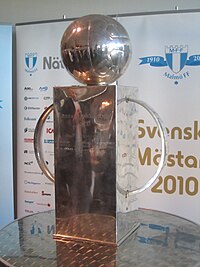
A | B | C | D | E | F | G | H | CH | I | J | K | L | M | N | O | P | Q | R | S | T | U | V | W | X | Y | Z | 0 | 1 | 2 | 3 | 4 | 5 | 6 | 7 | 8 | 9
 | |
| Founded | 13 January 1924 |
|---|---|
| Country | |
| Confederation | UEFA |
| Number of teams | 16 |
| Level on pyramid | 1 |
| Relegation to | Superettan |
| Domestic cup(s) | Svenska Cupen |
| International cup(s) | UEFA Champions League UEFA Europa League UEFA Conference League |
| Current champions | Malmö FF (26th title) (2023) |
| Most championships | Malmö FF (26 titles) |
| Most appearances | Sven Andersson (431) |
| Top goalscorer | Sven Jonasson (254 goals) |
| TV partners |
|
| Website | allsvenskan.se (in Swedish) |
| Current: 2024 Allsvenskan | |
| Swedish men's football league structure |
|---|
| Allsvenskan (Tier 1) |
| Superettan (Tier 2) |
| Ettan (Tier 3) |
| Division 2 (Tier 4) |
| Division 3 (Tier 5) |
| Division 4 (Tier 6) |
| Division 5 (Tier 7) |
| Division 6 (Tier 8) |
| Division 7 (Tier 9) |
| Division 8 (Tier 10) |
Allsvenskan (Swedish pronunciation: [ˈâlːˌsvɛnːskan]; English: the All-Swedish, also known as Fotbollsallsvenskan [ˈfûːtbɔlsˌalːsvɛnskan], English: the Football All-Swedish) is a Swedish professional league for men's association football clubs. It was founded in 1924 and is the top tier of the Swedish football league system, operating on a system of promotion and relegation with Superettan. Seasons run from late March or early April to the beginning of November, with the 16 clubs all meeting each other twice, resulting in a 30-match season, for a total of 240 matches league-wide.
Allsvenskan is ranked 23rd in the UEFA coefficients of leagues based on performances in European competitions over the last five years. Allsvenskan is currently ranked third highest of the leagues in Scandinavia after Norway and Denmark. The current champions are Malmö FF, who won the title in the 2023 season.
The three teams with most Swedish championships are Malmö FF (23), IFK Göteborg (18) and IFK Norrköping (13).
Including the 2023 season, Allsvenskan has been running for an unbroken streak of 99 seasons[update]. Unlike other European football leagues, the Allsvenskan did not experience an interruption in play during World War II due to Swedish neutrality.
History

Allsvenskan started in the 1924–25 Allsvenskan season and the first winner was GAIS. The one-league twelve team Allsvenskan replaced the Svenska Serien, consisting of a southern and northern group that was held before. In 1931, the league started to decide the Swedish football champions.
In the early years, Norrland and Gotland teams were not allowed to play on higher levels in the league system, which was gradually changed to include the Norrland and Gotland teams on higher levels.
For the 1959 Allsvenskan, the season start was changed from autumn to spring to be played in one calendar year. In 1973, it was expanded to contain 14 teams. In the 1970s, Malmö FF, under the lead of Spanish Antonio Durán and later English Bob Houghton, won five Allsvenskan and managed to proceed to the 1979 European Cup Final, which they lost to Nottingham Forest.
From the 1982 season, the league introduced a play-off to determine the Swedish football champions. In the late 1980s, Malmö FF were dominant, winning the league five times in a row, but only two Swedish championships. The 1990 season saw the introduction of three points per win. The play-off season years were followed by two years of continuation league, named Mästerskapsserien.
The 1993 season saw a return to the classical format, again with 14 teams. IFK Göteborg won five Allsvenskan league titles in the 1990s.
In the early 2000s, Djurgårdens IF won three titles (2002, 2003 and 2005). In 2004, Örebro SK lost its place in the league due to financial problems, and Assyriska FF got their place. Since 2008, the league consists of 16 teams.
Status

The champions are considered Swedish champions and gold medal winners. The runners-up are awarded the Large Silver medal, the third positioned team are awarded the Small Silver medal and the team positioned in fourth place are awarded the Bronze medal.
There have been seasons with exceptions when the winners of Allsvenskan wasn't considered Swedish champions as well. Allsvenskan winners between 1924 and 1930 were crowned league champions and awarded gold medals, the title of Swedish champions was awarded to the winner of Svenska Mästerskapet up until 1925 and then not at all until 1930. The years 1982 through 1990 are also exceptions, the title was instead decided through play-offs during these years. The same was true for the years 1991 and 1992 when the title was decided through a continuation league called Mästerskapsserien. Historically, however, there is a big difference between the Allsvenskan winners before 1931 compared to the period between 1982 and 1992. As winning Allsvenskan in its earlier seasons was the optimal aim for the clubs, while as during the era of play-offs and Mästerskapsserien, the optimal goal wasn't to win Allsvenskan, but the play-offs or Mästerskapsserien.
Competition format
Since 2008 there are 16 clubs in Allsvenskan. During the course of a season (starting in late March and ending in early November) each club plays the others twice (home and away) for a total of 30 games. The two lowest placed teams at the end of the season are relegated to Superettan and the top two teams from Superettan are promoted in their place. The third lowest team in Allsvenskan plays a relegation/promotion play-off against the third placed team in Superettan.
The winners of Allsvenskan qualify for the UEFA Champions League, the runner-up together with the third placed team in the table qualify for the UEFA Europa League as well as the team who wins the Svenska Cupen. In case the winner of the Cup has already qualified to Champions League or Europa League, the third Europa League spot is given to the team that finishes fourth in Allsvenskan.
Changes in competition format

| From | To | Teams | Match-weeks | Season Start | Season End | Play-offs |
|---|---|---|---|---|---|---|
| 1924–25 | 1956–57 | 12 | 22 | Autumn | Spring | — |
| 1957–58 | 33 | Next autumn | — | |||
| 1959 | 1972 | 22 | Spring | Autumn | — | |
| 1973 | 1981 | 14 | 26 | — | ||
| 1982 | 1983 | 12 | 22 | Play-offs with eight teams | ||
| 1984 | 1990 | Play-offs with four teams | ||||
| 1991 | 1992 | 10 | 18 | Summer | League with six teams | |
| 1993 | 2007 | 14 | 26 | Autumn | — | |
| 2008 | Present | 16 | 30 | — | ||
The decider at equal number of points was goal ratio until the 1940–41 season, thereafter goal difference.
Awards
Trophy
The current trophy awarded to the Swedish champions is the Lennart Johanssons Pokal. Created in 2001, the trophy is named after former UEFA chairman, Lennart Johansson. A different trophy that was named after Clarence von Rosen, the first chairman of the Swedish Football Association, had previously been used between 1903 and 2000, but was replaced after journalists reported that von Rosen had personal connections to the later infamous Nazi leader Hermann Göring during the time he lived in Sweden (soon after World War One).[1] The former President of the Swedish Football Association, Lars-Åke Lagrell stated that the reason for the change of trophy was not a personal attack against Von Rosen but rather that the Football Association did not want to be linked to Nazism and constantly engage in discussions regarding this every time the trophy was awarded.[1]
Player and manager awards
In addition to the winner's trophy and the individual winner's medals awarded to players, Allsvenskan also awards the most valuable player, goalkeeper of the year, defender of the year, midfielder of the year, forward of the year, newcomer of the year and manager of year at Allsvenskans stora pris together with C More and Magasinet Offside.[2] Also, the Allsvenskan top scorer is awarded.
Television
Sweden
The Swiss corporation Kentaro has owned the TV rights for Allsvenskan since 2006.[3] Through licence agreements with the media company TV4 Group matches are aired through C More Entertainment who broadcasts them on their C More Sport and C More Live channels, until 2019. Matches can also be bought through the online pay-per-view service C SPORTS.[4]
On 24 March 2017, Discovery-owned channel Eurosport and OTT streaming service dPlay will be the new domestic broadcaster for both SEF competitions (Allsvenskan and Superettan) effectively from 2020 until 2025, as well as selected European countries (exc. Italy) for Allsvenskan.[5]
International
Beginning in 2018, Allsvenskan matches were previously broadcast in the UK on Premier Sports and FreeSports.[6] In October 2018, ESPN picked up the rights to broadcast one Allsvenskan match per week in the United States.[7] Allsvenskan matches have also been broadcast in several countries, such as DAZN in Austria, Germany, and Switzerland, Sport Klub in Balkan countries,[8] Nova sports in Cyprus and Greece, TV2 in Norway[9] and 4th Sports in Iraq[10]
Current broadcast rights
| Region | Broadcaster |
|---|---|
| Eurosport, Discovery+ | |
| Sport Klub | |
| Eurosport | |
| TVB | |
| NENT | |
| 4th Sports | |
| Sportitalia | |
| LiveScore |
Clubs

AIK
Djurgårdens IF
Hammarby IF
IF Brommapojkarna
BK Häcken
GAIS
IFK Göteborg
A total of 67 clubs have played in Allsvenskan from its inception in 1924 up to and including the 2023 season. No club has been a member of the league for every season since its inception. AIK is the club that has participated in the most seasons, with a record of 96 out of 100 seasons in total. Malmö FF has the record for most consecutive seasons: 63 between 1936–37 and 1999. IFK Göteborg is currently the club with the longest running streak, starting their 48th season in 2024.
The following 16 clubs are competing in Allsvenskan during the 2024 season:
| Club |
Position in 2023 |
First season | Number of seasons | First season of current spell |
Titles | Last title |
|---|---|---|---|---|---|---|
| AIK | 11th | 1924–25 | 96 | 2006 | 6 | 2018 |
| BK Häcken | 3rd | 1983 | 24 | 2009 | 1 | 2022 |
| Djurgårdens IF | 4th | 1927–28 | 69 | 2001 | 8 | 2019 |
| GAIS | 2nd in Superettan | 1924–25 | 55 | 2024 | 4 | 1953–54 |
| Halmstads BK | 12th | 1933 | 57 | 2023 | 4 | 2000 |
| Hammarby IF | 7th | 1924–25 | 56 | 2015 | 1 | 2001 |
| IF Brommapojkarna | 14th | 2007 | 8 | 2023 | 0 | — |
| IF Elfsborg | 2nd | 1926–27 | 81 | 1997 | 6 | 2012 |
| IFK Göteborg | 13th | 1924–25 | 92 | 1977 | 13 | 2007 |
| IFK Norrköping | 9th | 1924–25 | 84 | 2011 | 13 | 2015 |
| IFK Värnamo | 5th | 2022 | 3 | 2022 | 0 | — |
| IK Sirius | 8th | 1969 | 11 | 2017 | 0 | — |
| Kalmar FF | 6th | 1949–50 | 37 | 2004 | 1 | 2008 |
| Malmö FF | 1st | 1931–32 | 89 | Zdroj:https://en.wikipedia.org?pojem=All-time_Allsvenskan_table
